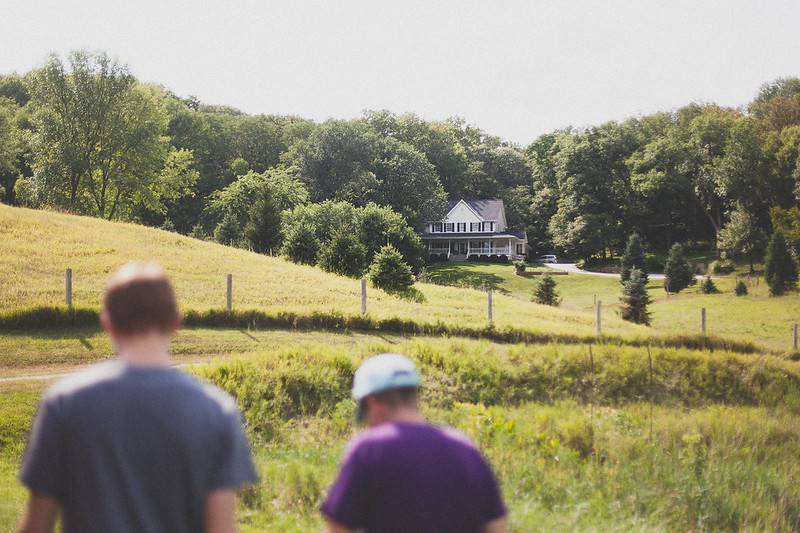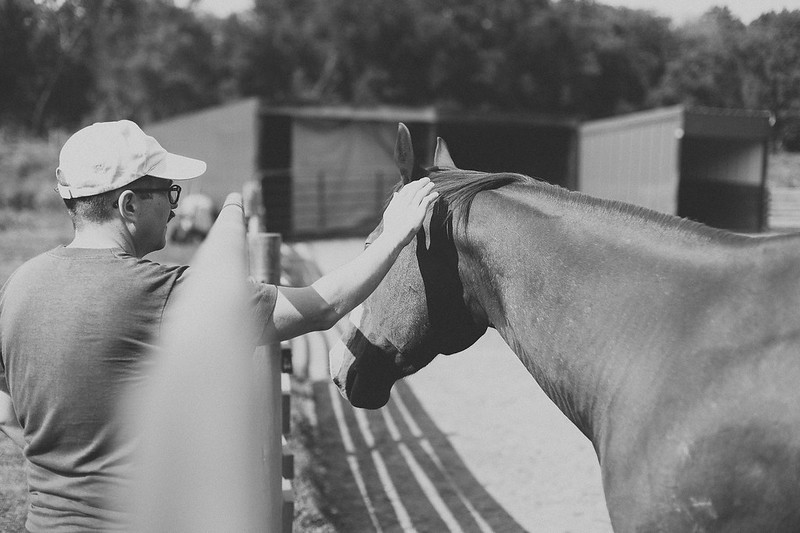[Editor’s Note: You’ll want to listen to the song “Picking At Scabs” before or while you read this.]
Decades ago, before the sloping plot of verdant land belonged to the McCarthy family, it was a Christmas tree farm.
And even though Dan McCarthy never grew up there, the farm’s past life feels impossibly fitting. A disappeared Tanenbaum farm: whimsical, with a sense of celebratory childishness. But lost to time. There is a McCarthy Trenching song in there somewhere.
It’s the first day of August, temperate beyond belief, and McCarthy and I are driving north of Omaha on John J Pershing Drive to the elder McCarthys’ property. It’s 30 minutes out of town, west of Neil Woods in Washington County.
McCarthy says the area also goes by the name “The North Hills,” undoubtedly the most poetic thing to call the modest, tree-covered bluffs. We’re in McCarthy’s spacious mini-van, which has seen a good portion of the country as the bulky chariot for McCarthy Trenching national tours. We’re heading north because of a song.
“Picking At Scabs” is not exactly the title track to McCarthy Trenching’s 2011 album Fresh Blood. But it’s the tonesetter. The whole album is endowed with stoic nostalgia, a hair smarter than 2008’s Calamity Drenching, with a dark humor that nudges sentiment out of the way.
The album title comes from the song’s chorus: “…picking at scabs / to see fresh blood…”
In the four-album family of McCarthy Trenching songs — ballads for the perpetual barroom class, commemorations of affairs that didn’t work out — “Picking At Scabs” might ring as the most stunning. It’s a story, centering on a trip to McCarthy’s parents’ farm, that’s so imaginative, and, frankly, so long, I felt lured toward a naive question of truth. Did an ill-fated fishing trip really spell the end of a relationship for Dan McCarthy? And either way, how on earth did he write a song so protracted and plainspoken about it? What well (or catfish pond) of creativity could be deep enough?
“The Missouri River isn’t exactly the prettiest smelling or looking river,” McCarthy says, as we pass the tall trees and soybean fields it’s fed. In this slice of the state, the river is a source of life to which any artist might feel drawn. Murky as it is.
Minutes out from the farm, ahead on a blocked-off road, the flooding of 2011 has created a lowland area of leafless, barkless skeleton trees, sky-reaching white bones in a mock of frozen, grotesque death, just beyond a cradle of life.
I felt that beyond them, we might find a songwriter with a gory, but eloquent, heart on his sleeve. And that’s the trick of the master craftsman.
* * *
“Picking At Scabs” is McCarthy Trenching’s “American Pie,” if the entire song was about the teenagers dancing in the gym.
What kind of shoes were the jitterbuggers wearing and how did the way they kicked them off explain their relationships to their parents? In this way, McCarthy’s song is a sprawling, non-epical epic. Par for the Trenching course, it references salty food, cold beer and does so with a folksy commitment to alarm-clock-punching realism. There’s a pointed emotionalism to the absolutely mundane, the only topical realm in which McCarthy thinks he has credibility, shying away from claims that seem too grand.
“Maybe I overshare, maybe it’s disgusting,” he says. “My life isn’t that interesting, it’s just the same stuff.”
Rather than tell you what love is, McCarthy will offer in a somehow simultaneously vague and detailed way, why it died or why it was too fickle to last.
Lyrically, “Picking At Scabs” is a pair of ex-lovers playing remember-when chicken on the phone. They converse about the narrator’s parents and then about the first time they were in bed. Then, the bulk of the song is a long trip out to the farm to catch catfish. It doesn’t end in disaster, more like disillusionment. Which, in this case, is worse.
McCarthy recalls tracking the seven-minute song at ARC Studios where producer Ben Brodin added the crucial pump organ over the chorus. That’s the melancholy haze that wrangles in the song’s balladic bounce, and makes you believe there is some kind of self-mutilation going on.
Where some of McCarthy’s best known songs — “The Most Attractive Disguise” and “To An Aesthete Dying Young” — live as short ditties that punch out of their weight class, the possibility of composing a seven-minute song was a product of bassist James Maakestad joining the band. He was a member of both Bear Country and Gus & Call, two bands known for writing long.
“I don’t know why I picked that one other than that it seemed like a long story,” McCarthy says. “I was trying to bring a longer song to James, like, ‘Hey, man, I can write long songs too!’”
Still, “Picking At Scabs” is full of small compositional mirages that turn about to be bits of absolute songwriting prowess when you look closer. For instance, McCarthy — instinctively, he says — often saves the darker line of a stanza for the guitar switch to the A minor chord and then a joke for the chord resolution. It’s the sort of tonal decision people often make one song at a time, not 15 times within one.
McCarthy rarely plays the song onstage, for its length and the attentiveness it takes for an audience to stick it out. But he does the following night at O’Leaver’s, a hometown stage that always feels like the optimal comfort venue for his kitchen and parlor poetry. That night, people are chuckling even around the 6:30-mark for McCarthy’s reference to a David Foster Wallace story in Brief Interviews With Hideous Men.
“Whatever he said about sexing chickens made you never wanna go back to the farm…”
* * *
The farm is as the song advertises it. Slightly quaint and picturesque, it’s anchored around the pond, which a small sign says is actually called Ragged Wood Pond. Another McCarthy Trenching song title waiting to happen.
McCarthy casually walks around it in a wide circle, giving the de facto tour. Casual and comfortable, he’s wearing puffy black New Balances, a purple t-shirt and a light blue cap. He gestures around at a quartet of horses, patches of human-height wildflowers and a staggeringly crafted treehouse (McCarthy’s father’s proudest creation). And it’s hard to believe the son never grew up here. But it’s hardly surprising he’s drawn to it, whether for music videos or source material. It’s a distinct amalgamation of farm life and estate life, all with topography unfound elsewhere in the state.
Between tangential stories about horses and bluegills, we return to the song. The experiences described on the farm were very real, though the woman was only a friend.
“We were never sleeping together,” McCarthy clarifies.
The catfish they caught were untenable, though McCarthy says Maakestad (a fisherman) has since told him he skipped the all-important step of soaking the fish in saltwater to get the “funk out.”
“I don’t know. They were so terrible though.”
Then it was over to the grocery store — a Hy-Vee in Midtown, he thinks — where the man in overalls made a pass at his friend. McCarthy never found out what the man said, but his friend wanted to leave immediately.
“Real things and people are fair game,” McCarthy says. “It seems like songwriting is what matters and who cares if it actually happened? Maybe if you’re really good, you can create from whole cloth.”
And what of the phone calls wrought with the anxious, knowing conversations only exes can have?
“I think that was purely to rhyme ‘plumber’ with ‘number.’”
“Is that true?”
“I think it was!”
“Like a lot of my songs,” he continues, “it starts with a funny situation or punchline and then constructing the rest of it to get there.”
It’s not unlike someone who set out to write a short joke, found it too bare, and then impossibly wrote a touching and insightful novel just to dress it up a bit. Then he steps away from the finished product, looks back and mostly sees the quips.
Then, we’re leaning on fence posts, and I’m asking about how it feels to play the song, whether it’s difficult emotionally, whether it picks at any personal scabs.
Dan McCarthy is charming, ingratiating and funny. Mid-question, he’s jokingly littering an aluminum can on the unblemished land. It strikes me later that such a person doesn’t take much pleasure in making people uncomfortable by saddling them with a confessional monologue.
Even the chorus, with its violent themes of attrition, has another life as a commentary on songwriting. It references people who sift the dregs of their pasts to work up the nerve, or a state of being unnerved, to write. He likens it the proverbial murder of the man in Reno. To head down-market quickly, I’d liken it to Goo Goo Dolls’ “Iris.” Self-inflicting pain just to feel something.
“I think I was having some doubts about why I write songs and that kind of crap,” McCarthy says. “[That’s] what that kind of song is doing. For a lot of people who write romance songs, I think.”
“But that’s not what you were doing?”
“Mea culpa, right?,” he laughs. “But I think there are people who do it more or have made a career out of it. But it’s a perfectly good way to make songs for Christsakes.”
We leave the fence and turn into the woods, a sea of trees that makes you realize the home is just an incredibly well-kept clearing, not that the woods are an addition. They came first.
Like the Rubin vase optical illusion, McCarthy sees the humorous qualities of the song foremost. He doesn’t consider “Picking At Scabs” in the same vein as “I Am Not Long For This World,” a suicidal-feeling sermon from his self-titled debut in 2007. He scarcely plays that song anymore.
“That one is almost too dreary,” he says. “I think I’m a happier person than I was then. [‘Scabs’] doesn’t hurt my feelings. There’s no song we have that’s too personal to play.”
At worst, my line of questioning ignores the promises and principles of McCarthy Trenching’s realism, which would rather depict than divulge.
By this point, we are several hundred yards into the woods. Light is scarcer, and we quicken our gait to thwart the hefty, thirsty mosquitoes. We halt near a dried-up creek bed that swallows the path.
“This kinda turns into a dead end,” McCarthy says.
* * *
Joe Swanberg’s Drinking Buddies is a disturbing movie if you believe in a kind of cosmic, underdog-loving, mass market love. In short, a pair of star-crossed coworkers are destined to be together. When they almost are, they’re moving a couch, and one cuts his hand. There is blood everywhere. They suddenly realize their relationship is not stress-tested for such things. In an instant, their adult love cannot stand up to adulthood.
Similarly, “Picking At Scabs,” captures a tipping point. We know the man and woman on the phone are no longer together. They once shared an area code, and now they don’t. The promise of a postcard-worthy day at the farm is shot down by poisoned catfish and vulgar strangers.
It’s not the first time McCarthy has touched on such a what-if scenario. In “Wedding Song,” his narrator professes he may have married young had he picked up the phone on just one occasion.
“I’m sure an economist would find the moment their checking account got out of balance,” McCarthy says. “Do you think most people have their little recipe box of their most embarrassing or mortifying shit? And they go through it once in a while? For no good reason?”
McCarthy says the highest praise he could have received for “Picking At Scabs” arrived while touring New York in 2011. A woman approached him after his set, and professed the whole thing reminded her of a Raymond Carver short story.
Recounting that story three years later, McCarthy still fist pumps with Tiger Woods’ enthusiasm.
“That’s exactly what I was going for!”
The world is full of songwriters who seek to be part of folk traditions, to carry on stylistic legacies, to go back in time. Seldom do they aspire to the incidence of a Raymond Carver story, an admission that they are fiction writers, not singing autobiographers. Seldom are songwriters such chefs of their own lives and the imagined as Dan McCarthy.
There are many songs ripped from the lives of heartbroken people, but it wasn’t one of those that took us out to the farm that day. It wasn’t one of those that made me believe I was hearing something that could only be real.
The place where confessional songs live is full of growls and tears and scratches: someone waiting to tell the world they were always already telling the truth. The place those songs live is the grove of skeleton trees. They are starker and more eye-catching than the lush forestry and indecipherable river around them.
But they cannot convince us that they once lived.











